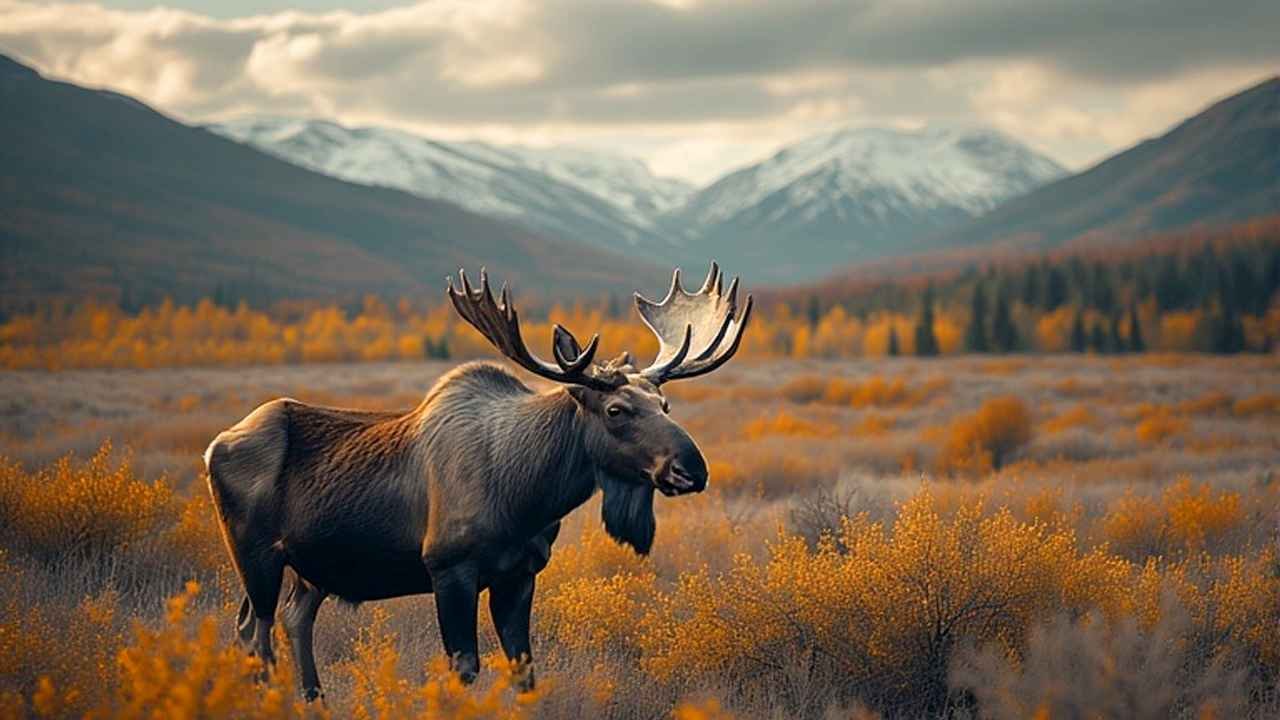Complete Guide to Hunting in Alaska: 2025 -2026 Regulations and Zones
Welcome to the best resource on Alaska’s hunting seasons in 2025–2026! Key dates, species information, permit requirements, and wildlife management areas are all covered in this guide, whether you live in the region or are planning a trip to the Last Frontier. With its extensive public areas and varied wildlife, Alaska provides some of the most distinctive and fulfilling hunting experiences in the United States. However, keep in mind that laws are subject to change, so before leaving, always confirm with official authorities. Let’s begin! 🦌🌲
📅 Quick Reference Points
- Deer: Sitka black-tailed deer seasons vary by zone, generally running from August 1 to December 31, with bag limits of 2–4 bucks depending on the area .
- Bear: Black bear seasons can span nearly year-round in some zones (e.g., Sept 1–June 30 in Zone 1C), while brown/grizzly bear hunting is typically allowed in spring (Mar 15–May 31) and fall (Sept 15–Dec 31) .
- Moose: General seasons often occur in September and October, with specific dates varying by unit .
- Turkey: No closed seasons or bag limits in many units (e.g., Units 1-26) .
- Youth Opportunities: Special youth hunts exist for species like deer (e.g., Zone 5: Oct 15–Nov 30) .
- Licenses: Required for most hunters; non-residents need a big game locking-tag for species like bear, moose, and sheep .
🦌 Big Game Overview
| Species | Season Type | Dates (2025–2026) | Key Details |
|---|---|---|---|
| Sitka Black-Tailed Deer | General | Varies by zone (e.g., Aug 1–Dec 31 in Zone 1B) | Bag limits range from 2–4 bucks depending on zone; some areas have antlerless periods . |
| Moose | General | Sept 15–Oct 15 (e.g., Zones 1A-C) | 1 bull per regulatory year; non-residents require a guide for some hunts . |
| Brown/Grizzly Bear | General | Mar 15–May 31 and Sept 15–Dec 31 | 1 bear per regulatory year; non-residents must hunt with a guide or qualified resident relative . |
| Black Bear | General | Sept 1–June 30 (Zone 1C) | Bag limits: residents 2 bears, non-residents 1 bear . |
| Mountain Goat | General | Aug 1–Dec 31 (e.g., Zone 1B) | 1 goat; hunters must complete a mountain goat ID quiz . |
| Elk | General | Sept 1–Nov 30 (Zone 3) | 1 bull; limited to specific areas like Etolin Island . |
Note: Non-residents hunting brown bear, Dall sheep, or mountain goat must be accompanied by a licensed guide or a qualified resident relative (e.g., parent, sibling) .
🦃 Turkey Dates
| Season Type | Dates | Key Details |
|---|---|---|
| General Season | No closed season (Units 1-26) | No bag limits; legal methods include shotgun, archery, and muzzleloader . |
| Youth Hunts | Not specified | Check specific unit regulations for youth opportunities. |
Turkey hunting in Alaska is largely unregulated in many units, making it a great option for beginners .
🦝 Furbearer Opportunities
| Species | Season | Key Details |
|---|---|---|
| Coyote | Year-round in many areas | No bag limits; nighttime hunting license required in some cases . |
| Wolf | Aug 1–Apr 30 (e.g., Zone 1B-D) | Bag limit of 5 wolves; harvest tickets required . |
| Wolverine | Sept 1–Feb 15 (e.g., Zone 1) | Bag limit of 1; trapping license needed for residents . |
| Fox | Varies by unit | Arctic fox seasons shortened in some areas (e.g., Unit 10) . |
🐦 Small Game Section
| Species | Season Dates | Daily Bag Limit |
|---|---|---|
| Ptarmigan | Aug 20–Feb 15 (Unit 13B) | Varies by unit; shortened season in some areas . |
| Hare | Closed in Units 9 and 17 | N/A (season closed for Alaska hares) . |
| Grouse | Generally year-round | No bag limits in many units. |
Small game hunting is less regulated but offers a fun way to enjoy Alaska’s outdoors .
🦆 Complete Waterfowl Seasons
| Species | Season Framework | Key Details |
|---|---|---|
| Ducks | Generally Sep–Jan | Zones include Southeast, Southcentral, and Interior; bag limits vary by species. |
| Geese | Sep–Feb | Includes Canada, snow, and white-fronted geese. |
| Teal | Sep (16 days) | Early season for blue-winged and green-winged teal. |
Licenses: All waterfowl hunters aged 16+ must have a State Duck Stamp ($10 for residents) and a Federal Duck Stamp ($30) .
🐗 Other Available Game
| Species | Season | Key Details |
|---|---|---|
| Bison | By drawing permit | Proxy hunting allowed for elderly/disabled hunters . |
| Sandhill Crane | Not specified | Check federal and state regulations for migratory birds. |
| Frog | Year-round | No closed season; gigging or bow allowed. |
Alaska also offers opportunities for species like muskox and elk via drawing permits .
🗺️ Hunting Zones
Alaska is divided into 26 game management units (GMUs) across five regions: Southeast, Southcentral, Interior, Central/Southwestern, and Northwest/Western . Each unit has specific rules and seasons, so always verify the GMU for your area. For a detailed map, visit the Alaska Department of Fish and Game website.
Public Land Tips: Over 90% of Alaska is public land, but access can be challenging. Some areas require permits or have restricted use, so review WMA regulations beforehand .
🎟️ License & Permit Details
| License Type | Resident Fee | Non-Resident Fee | Key Exemptions |
|---|---|---|---|
| Hunting License | $45 | $160 | Residents under 18 or over 60 exempt . |
| Trapping License | $25 | $405 (hunting/trapping combo) | Required for furbearers . |
| Waterfowl Stamp | $10 | $10 | Required for waterfowl hunters 16+ . |
| Big Game Locking-Tag | Varies by species | $300–$2,200 (e.g., $800 for moose) | Required for non-residents hunting big game . |
Additional Info:
- Hunter Education: Required for hunters born after Jan 1, 1986, in some units .
- Drawing Permits: Apply between Nov 1 and Dec 15 for species like bison, sheep, and goat .
- Subsistence Permits: Available only to Alaska residents for cultural and subsistence needs .
❓ Alaska Hunting Quick FAQ
- Do non-residents need a guide?
Yes, for brown bear, Dall sheep, and mountain goat. Non-residents must be accompanied by a licensed guide or a qualified resident relative (e.g., parent, sibling) . - When is the application period for drawing permits?
The application period runs from November 1 to December 15 each year for the following year’s hunts . - Are there any new regulations for 2025–2026?
Yes, including a mandatory moose orientation for non-residents and a mountain goat ID quiz for all goat hunters . - Can I hunt on public land?
Most of Alaska is public land, but some areas require special permits or have access restrictions. Always check the GMU regulations . - What is “tagging down”?
If you have a locking-tag for a high-value species (e.g., brown bear) and don’t harvest one, you can use it for a species of lesser value (e.g., caribou) if you have a harvest ticket for that animal . - Are there youth-specific hunts?
Yes, for species like deer (e.g., Zone 5: Oct 15–Nov 30) . - Do I need a federal duck stamp?
Yes, all waterfowl hunters aged 16 and older must purchase a federal duck stamp in addition to a state stamp .
🔗 List of Related Guides
- Alabama Hunting Seasons – Compare regulations and plan trips across states!
- Official Alaska Hunting Regulations – The ultimate resource for detailed rules.
Conclusion
The 2025–2026 hunting seasons in Alaska provide unmatched chances for adventure, with everything from small game and waterfowl to large game like moose and bear. Planning ahead is crucial because of the variety of public lands and special restrictions. Verify dates, get permissions in advance, and go over GMU-specific guidelines. Always put ethics and safety first, whether you’re a local hunter or a visitor. Bookmark this guide and stay updated through the Alaska Department of Fish and Game for the latest info. Have fun while searching! 🐾🎟️

